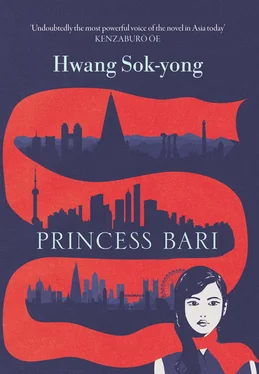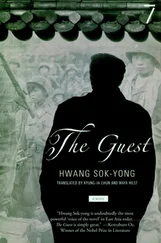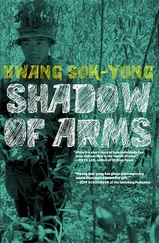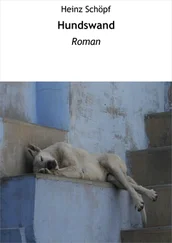“That means you saw something when you touched my feet, too!”
I didn’t answer, but she immediately chuckled to herself as if to say there was no use worrying about that now.
“I guess you saw all my dreadful ex-boyfriends.”
I debated whether or not to keep quiet, but then decided to say something in order to hold her attention a little bit longer.
“I saw your white father, and the black man your mother met when she was working at the hospital.”
“Oh my!” Auntie Sarah’s hands slipped on the steering wheel, and the car swerved. “You’re really something, kid!”
I didn’t tell her about the form that looked like a dark cloud wrapped around Lady Emily, or the bodies. When the car pulled up in front of Tongking, she handed me an envelope. I got out of the car and looked inside: there was far more in there than just my hourly fee. If I kept working at that rate, I would be able to pay off my debts in Chinatown within six months. For the first time I felt my heart grow lighter. I gave the money for my hourly fee to Uncle Tan and kept the rest. He looked satisfied to have such a wealthy regular who would provide a fixed income for the salon.
The following week, I took the Underground to the mansion on my own, address in hand. I was so scared that my heart nearly beat out of my chest, but at the same time I was happy that I had the freedom to go anywhere now.
By the time I had made the two station transfers, walked down the side street next to Holland Park and arrived at the house in Kensington, I was ten minutes late. I went downstairs and rang the bell. Auntie Sarah’s face appeared.
“I was worried you wouldn’t find it,” she said.
“I took the wrong train and had to make a different transfer.”
“Lady Emily’s waiting for you. She’s already asked me twice why you’re not here yet.”
Auntie Sarah led me up to the living room on the second floor. Lady Emily was resting on the sofa, wearing a sky-blue silk Chinese gown.
“Yes, come in,” Lady Emily said in a drowsy voice.
Auntie Sarah gave me a nod and then vanished.
“Would you like a cup of tea?” Lady Emily asked. “We don’t have to start with the massage today.” She spooned some dark tea into a porcelain pot that was ready on the table.
“Is that black tea?” I asked.
“No, it’s made from medicinal herbs. It’ll relax you and make you feel better.”
I took a hesitant sip. There was no flavour at all, but it smelled like dried leaves and earth. I followed Lady Emily into the bedroom; she had me recline on the chaise while she lay down on the bed.
“Let’s converse, Bari. You’ll know what to do.”
I felt my back start to rise and fall, as if I were bobbing on the ocean, and then my body went slack and I felt like I was floating down a river. From between my fluttering eyelids, which insisted on closing, I caught a glimpse of someone standing over Lady Emily’s bed. It looked like an older black woman wearing a heavy brown cloak made from a rough material.
“There’s someone’s behind you,” I said. “A black woman.”
Lady Emily was not startled at all.
“Yes,” she whispered. “That must be my nanny, Becky. She watches over me.”
I tried to sit up in order to greet Becky, but for some reason my arms and legs would not obey. Lady Emily’s quiet voice reached my ears.
“Go to sleep, child. Go to sleep.”
*
I stand in a field with dry grass up to my waist. The setting sun looks like a deliciously ripe persimmon. It turns the whole sky a deep, orangey red. A slow rhythm, like distant drumming, vibrates in my ears. I can’t tell whether or not it is my own heartbeat that I am hearing.
At the centre of the field, enormous stone mountains tower up out of the earth and seem to brush against the sky. The further I walk into the mountains, the more they resemble two palms opening. At the centre I see a large pit, like the mouth of some giant creature, gaping open in the middle of a wide clearing. The bottom of the pit is drilled here and there with dark holes that go so far down I cannot tell where they end. Black men, seemingly thousands of them, fill burlap sacks with stones dug from the sides and bottom of the pit with pickaxes and shovels. They haul the stones up rope ladders and march up the winding ledge that leads out of the pit, carrying their heavy loads.
To one side of the clearing, I see structures built from wooden planks, thatched roofs and white canvas awnings. White men sit in a circle beneath one of the awnings. One wears a white shirt and hat and has a moustache. I see soldiers in uniform.
I wander around inside the image. A rope ladder breaks and dozens of men are sent tumbling to the bottom of the pit. A gun goes off, and more shots follow sporadically. Then everything goes silent. The soldiers walk over to the fallen and inspect them.
I walk back to the field. The field is blanketed in the same black, fog-like shapes that I saw in my home country, and the low whoosh of the wind never stops. The sky is dim, as if the sun is on the verge of either rising or setting, and it is just as quiet. Spots of light appear here and there. Smoke rises from the roofs of a burned village, and embers fly over the burned grass and reeds. Everywhere, dead bodies are picked at by vultures and crows. The ground is littered with weapons. Did a battle take place?
I see trees. Baobab trees with their roots sticking straight up toward the sky. Ash, oak, acacia, marula. All kinds of trees tower over me like fortress walls, and at the centre I see a light. I slip between the trees, sliding toward the light. Patches of colour — white, ochre, grey, blue — appear in the light. People are there, dressed in colourful fabrics. I take a closer look and see that they are nearly all female: grandmothers, mothers, young women. And children: grandsons, granddaughters, newborn babies. The light is coming from an enormous bonfire rising from a triangular stack of logs. No one speaks.
They know that I am watching. And I know they are not alive. As I walk toward the bonfire, they cover their faces and step back to clear a path. Standing before the fire is a woman. She’s been waiting for me. When I am standing before her, I see that it’s Becky. She wears a headband laden with crystal beads on top of a headscarf, and on her body she wears a black skirt and a rough, brown cloth around her shoulders. Ostrich-tail feathers are stuffed in the back of the headband like scattered clouds floating over her head.
You must be Bari, the one my baby girl Emily sent.
She plucks one of the ostrich feathers from the back of her head and sweeps it along the ground, which splits open as if during an earthquake, and the people who were scattered about all crowd in at once, turn to shadows, and seep into the earth like fog, filling the crevasse. A hand sticks up out of the fog, then two arms, followed by a white man’s face. It’s the man with the moustache whom I saw sitting under the tent earlier. Another pair of flailing arms emerges, followed by the upper body of the white-haired man in the dark-red military uniform. The murky fog is less like a gas and more like a sticky, muddy bog. The shadows pull the two white men back down as they scream and shout.
Let me go!
Get us out of here!
Suddenly the crack vanishes, and the earth closes up. The shadows have resumed their original forms and are sitting and standing under the trees. The bonfire blazes again. From the entrance to the forest where I came in earlier, Lady Emily walks toward me, dressed in the same blue silk gown as before. Her eyes are wet with tears. She pleads with Becky.
Please release them.
Becky’s face is impassive.
It’s not me, child. The souls of the dead won’t let them go.
Читать дальше












